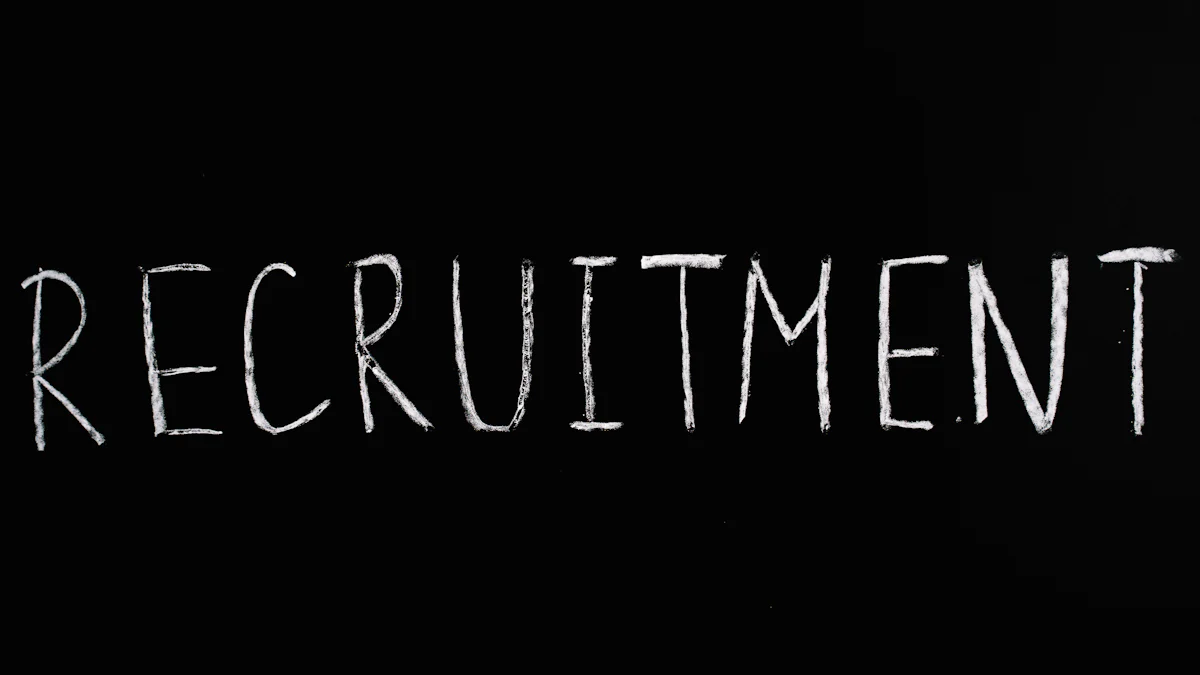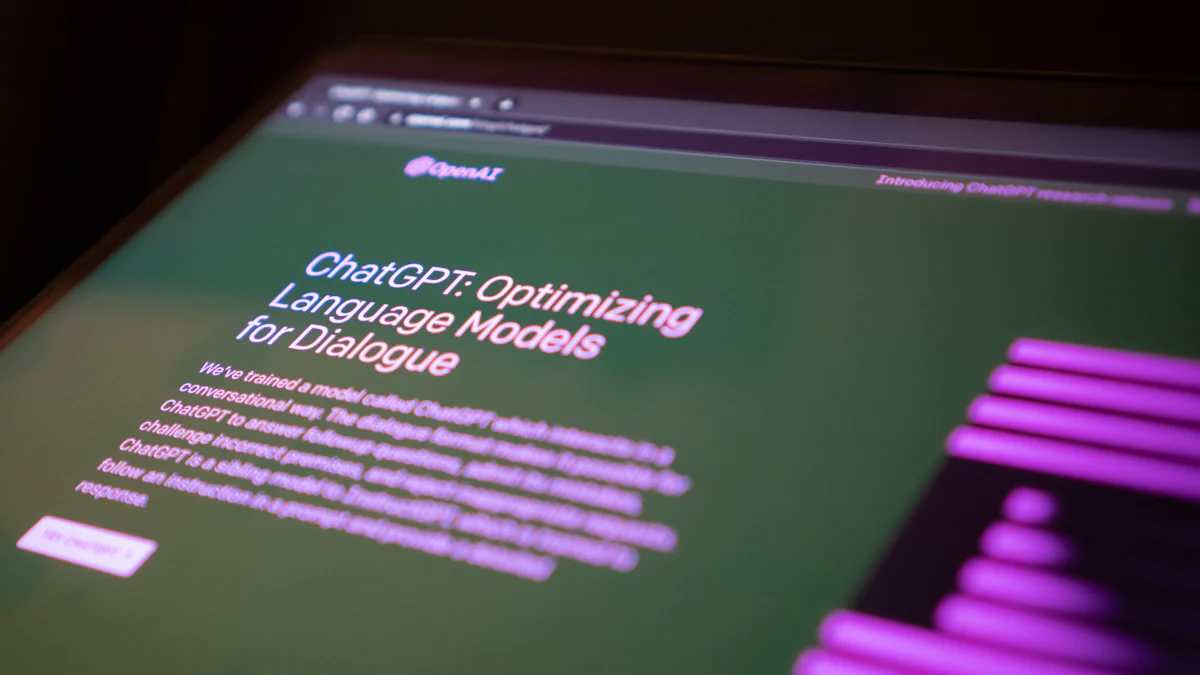Understanding AI Hiring Software for Better Recruitment

AI hiring software revolutionizes the recruitment and hiring landscape. You can experience a significant boost in efficiency, with AI reducing the labor-intensive parts of the hiring process by up to 75%. This technology not only speeds up recruitment but also enhances the candidate experience. By leveraging AI and HR technology, you gain insights that lead to informed decision-making. AI in recruitment helps you identify the best candidates swiftly, ensuring a seamless hiring process. With 72% of employers already using AI, it's clear that this technology is transforming how you approach recruitment.
Key Takeaways
AI hiring software can reduce the labor-intensive parts of recruitment by up to 75%, significantly boosting efficiency.
Automated resume screening allows for faster processing of applications, helping you identify qualified candidates quickly.
Integrating AI with existing recruitment systems streamlines tasks like interview scheduling, freeing up time for strategic engagement with candidates.
AI promotes fair hiring practices by reducing bias in candidate evaluation, ensuring a more inclusive recruitment process.
Personalized communication through AI enhances the candidate experience, making applicants feel valued and informed throughout the hiring process.
Regular audits of AI data and algorithms are essential to mitigate biases and ensure a fair recruitment process.
The future of AI in recruitment promises further automation and innovations, allowing HR professionals to focus on building relationships and making informed decisions.
The Role of AI in Recruitment

Overview of AI Technologies in Hiring
AI technologies have become integral to the recruitment and hiring landscape. You can leverage these tools to streamline various aspects of the hiring process. AI hiring software like Beamery and Breezy HR utilize machine learning algorithms to identify the most qualified candidates for a position. These platforms offer features such as automated resume screening, candidate sourcing, and talent analytics. By using AI, you can efficiently parse through numerous resumes, identifying key qualifications and matching candidates to job descriptions with high accuracy. This not only saves time but also enhances the quality of candidate selection.
Automated Resume Screening is a prime example of AI's impact. Traditional methods required you to manually sift through resumes, which was time-consuming and prone to bias. Now, AI-powered tools can scan and analyze resumes at scale, reducing the time spent on pre-screening and increasing the chances of finding the best-fit candidates. This efficiency allows you to focus on more strategic tasks, improving the overall recruitment process.
Integration of AI with Existing Recruitment Systems
Integrating AI with your existing recruitment systems can significantly enhance your hiring strategy. AI and HR technology work together to automate repetitive tasks, such as interview scheduling and candidate engagement. This integration reduces the manual workload, allowing you to concentrate on building relationships with candidates and making informed hiring decisions.
AI solutions like AI Software for Recruitment help streamline hiring processes by analyzing candidate data and predicting job performance. These tools not only improve speed and accuracy but also help reduce hiring biases and increase candidate diversity. By incorporating AI into your recruitment systems, you can ensure a fairer and more efficient hiring process.
Incorporating AI into recruitment and hiring processes offers numerous benefits. You can experience improved efficiency, reduced bias, and enhanced candidate experience. As AI continues to evolve, its role in recruitment will only grow, providing you with innovative solutions to meet your hiring needs.
Applications of AI in Recruitment
Resume Screening
Automated Parsing and Analysis
AI hiring software has transformed resume screening into a highly efficient process. You can now rely on AI algorithms to scan and analyze resumes at an unprecedented speed. These tools evaluate thousands of resumes in seconds, identifying the most qualified candidates based on predetermined criteria. This automation not only saves you time but also enhances the accuracy of matching candidates to job roles. By focusing on a candidate's entire profile, including skills and experiences, AI provides a comprehensive view of their potential contributions to your organization.
Identifying Key Skills and Qualifications
In recruitment and hiring, identifying key skills and qualifications is crucial. AI excels in this area by analyzing resumes beyond mere keywords. It evaluates the context and relevance of a candidate's skills, ensuring a better match with job requirements. This capability allows you to make informed decisions quickly, reducing the time spent on manual resume screening. As a result, you can focus on strategic recruitment strategies that enhance your talent acquisition efforts.
Candidate Sourcing
Leveraging AI for Talent Discovery
AI and HR technology play a pivotal role in candidate sourcing. You can leverage AI to discover talent across various platforms, broadening your talent pool. AI tools track and analyze data from multiple sources, helping you identify potential candidates who may not have applied directly. This proactive approach to talent acquisition ensures you have access to a diverse range of candidates, increasing the likelihood of finding the perfect fit for your organization.
Enhancing Diversity in Candidate Pools
AI in recruitment also contributes to enhancing diversity in candidate pools. By eliminating biases inherent in traditional recruitment methods, AI promotes fair hiring practices. You can ensure a more inclusive recruitment process by using AI to evaluate candidates objectively. This approach not only aligns with ethical hiring practices but also enriches your organization's culture by bringing in diverse perspectives and experiences.
Interview Scheduling
Streamlining the Interview Process
Interview scheduling often poses a significant administrative burden. AI hiring software streamlines this process by automating scheduling tasks. You can coordinate interviews efficiently, reducing the back-and-forth communication typically involved. This automation frees up your time, allowing you to focus on engaging with candidates and making informed hiring decisions.
Reducing Administrative Burden
AI reduces the administrative burden associated with interview scheduling. By automating repetitive tasks, AI allows you to concentrate on building relationships with candidates. This shift from administrative tasks to strategic engagement enhances the overall recruitment and hiring experience. You can ensure a smoother process for both your team and the candidates, ultimately leading to better hiring outcomes.
Benefits of AI in Recruitment

Improved Efficiency
Faster Processing of Applications
AI hiring software significantly enhances the efficiency of processing applications. You can quickly sift through a large volume of resumes, identifying qualified candidates with remarkable speed. This rapid processing allows you to focus on other critical aspects of recruitment and hiring. According to a survey, 44.2% of recruiters reported a significant acceleration in the hiring process due to AI. This efficiency not only saves time but also ensures that you do not miss out on top talent.
Reduced Time-to-Hire
AI reduces the time-to-hire by streamlining various stages of the recruitment process. Automated resume screening and candidate sourcing enable you to identify potential hires faster. This swift action helps you secure the best candidates before your competitors do. By reducing the time-to-hire, you enhance your organization's ability to respond to market demands and fill positions promptly.
Reduced Bias
Objective Candidate Evaluation
AI in recruitment promotes objective candidate evaluation. By relying on data-driven insights, you can assess candidates based on their skills and qualifications rather than subjective opinions. This objectivity ensures that you make informed decisions, selecting the best fit for your organization. AI's ability to evaluate candidates without bias aligns with ethical hiring practices, fostering a fair recruitment environment.
Promoting Fair Hiring Practices
AI and HR technology play a crucial role in promoting fair hiring practices. By eliminating biases inherent in traditional recruitment methods, AI ensures a more inclusive process. You can evaluate candidates based on merit, enhancing diversity within your organization. This approach not only enriches your workplace culture but also aligns with modern recruitment strategies focused on equality and fairness.
Enhanced Candidate Experience
Personalized Communication
AI enhances the candidate experience by enabling personalized communication. You can engage with candidates through tailored messages, providing them with relevant information about the hiring process. This personalized approach makes candidates feel valued and informed, improving their overall experience. By maintaining open lines of communication, you build a positive relationship with potential hires.
Transparent Hiring Processes
Transparency in the hiring process is vital for a positive candidate experience. AI and HR technology facilitate transparent recruitment by providing candidates with clear insights into each stage of the process. You can keep candidates informed about their application status, ensuring they understand what to expect. This transparency builds trust and confidence, making candidates more likely to accept job offers and recommend your organization to others.
Risks and Limitations of AI in Recruitment
Data Quality Concerns
Ensuring Accurate and Relevant Data
In the realm of recruitment and hiring, data quality plays a crucial role. You rely on accurate and relevant data to make informed decisions. AI hiring software depends heavily on the data it processes. If the data is flawed or outdated, the AI's output may not accurately reflect the qualifications of candidates. Ensuring that the data fed into AI systems is both accurate and up-to-date is essential. Regular audits and updates of your data sources can help maintain the integrity of the recruitment process.
Mitigating Data Bias
Bias in AI systems can arise from the data used to train them. If the data reflects past biases, the AI might replicate these biases in its decisions. This can lead to discrimination against certain groups of candidates. To mitigate this, you should focus on constructing unbiased datasets. Regular reviews and audits of AI algorithms can help identify and rectify any biases. By doing so, you ensure a fairer recruitment process that evaluates candidates based on their true qualifications and potential.
Need for Human Oversight
Balancing Automation with Human Judgment
While AI and HR technology offer numerous benefits, human oversight remains crucial. You must balance automation with human judgment to ensure the recruitment process remains fair and effective. AI can handle tasks like resume screening and candidate sourcing efficiently, but human intuition and understanding are irreplaceable. By combining AI's speed and accuracy with human insight, you can make more informed decisions that align with your organization's values and goals.
Ethical Considerations in AI Use
Ethical considerations are paramount when using AI in recruitment. You need to ensure that AI tools are used responsibly and transparently. This involves setting clear standards and guidelines for AI use in hiring. Regular training and awareness programs can help your team understand the ethical implications of AI. By fostering an environment of ethical AI use, you contribute to a recruitment process that respects candidates' rights and promotes fairness.
The Future of AI in Recruitment
Emerging Trends and Innovations
The future of AI in hiring is bright and full of potential. As AI continues to evolve, it introduces new trends and innovations that reshape recruitment. You can expect AI to further automate and streamline the hiring process. Machine learning and natural language processing will play crucial roles in this transformation. These technologies help you source candidates, screen resumes, and even conduct pre-employment assessments with greater efficiency.
AI and HR technology are becoming more sophisticated. They now offer features like chatbots for initial candidate interactions and email assistants for scheduling interviews. These tools reduce the manual workload and allow you to focus on strategic tasks. By leveraging AI, you can gain deeper insights into candidate selection, ensuring you make informed decisions.
"AI is revolutionizing the recruitment landscape, offering unparalleled efficiency and deeper insights into candidate selection."
In the future, AI will likely enhance diversity, equity, and inclusion (DEI) in recruitment. By analyzing resumes based on predefined criteria, AI can help eliminate unconscious bias. This ensures a fairer hiring process and enriches your organization's culture with diverse perspectives.
Long-term Implications for HR Professionals
The integration of AI and HR technology has significant long-term implications for HR professionals. As AI automates routine tasks, your role will shift towards more strategic functions. You will have more time to focus on building relationships with candidates and making data-driven decisions.
AI's ability to predict employee fit and success will become increasingly valuable. You can use these insights to tailor your recruitment strategies and improve hiring outcomes. However, it's essential to maintain human oversight. Balancing automation with human judgment ensures that ethical considerations remain at the forefront of your recruitment process.
The future of AI in hiring promises to enhance efficiency and accuracy. It will transform how you approach recruitment, allowing you to focus on strategic initiatives. By embracing these changes, you can stay ahead in the competitive landscape and attract top talent to your organization.
AI has significantly transformed recruitment, making it faster, more accurate, and less biased. By automating repetitive tasks, AI allows you to focus on strategic initiatives, enhancing overall productivity. It processes vast amounts of data, providing insights that lead to informed hiring decisions. As AI continues to evolve, its role in shaping hiring practices will expand. You can expect AI to further streamline workflows and reduce biases, ensuring a fairer recruitment process. Embracing AI in recruitment not only improves efficiency but also prepares you for the future of talent acquisition.
FAQ
What are AI-powered recruitment solutions?
AI-powered recruitment solutions refer to technologies that use artificial intelligence to enhance the hiring process. These solutions automate tasks like resume screening, candidate sourcing, and interview scheduling. By doing so, they improve the efficiency of recruitment and help you find the most qualified candidates quickly. AI-powered tools also provide insights into candidate data, allowing you to make informed decisions.
How do AI recruitment tools improve the candidate experience?
AI recruitment tools enhance the candidate experience by streamlining communication and providing timely updates. These tools can send personalized messages to candidates, keeping them informed about their application status. This transparency builds trust and ensures candidates feel valued throughout the hiring process. Additionally, AI tools can match candidates to roles that best fit their skills, improving their overall experience.
What are the common applications of AI in recruitment technology?
AI in recruitment technology has several applications. You can use it for sourcing and screening candidates, analyzing resumes, and conducting pre-employment assessments. AI tools also predict employee fit and success, helping you make better hiring decisions. These applications not only speed up the process but also reduce biases, promoting diversity in your talent acquisition efforts.
How do AI-powered recruiting tools help in talent acquisition?
AI-powered recruiting tools assist in talent acquisition by automating repetitive tasks and providing data-driven insights. They help you identify potential candidates from various sources, broadening your talent pool. These tools also analyze candidate data to predict job performance, ensuring you select the best fit for your organization. By leveraging AI, you can enhance your recruitment strategies and attract top talent.
Can AI-powered candidate search improve diversity in hiring?
Yes, AI-powered candidate search can improve diversity in hiring. These tools evaluate candidates based on objective criteria, eliminating biases inherent in traditional methods. By focusing on skills and qualifications, AI ensures a fairer selection process. This approach promotes diversity, enriching your organization's culture with varied perspectives and experiences.
How do applicant tracking systems integrate with AI?
Applicant tracking systems (ATS) integrate with AI to enhance the recruitment process. AI analyzes data within the ATS to identify patterns and trends, helping you make informed decisions. It automates tasks like resume screening and interview scheduling, reducing the manual workload. This integration ensures a more efficient and effective recruitment process.
What are the benefits of using AI-powered recruitment solutions?
AI-powered recruitment solutions offer numerous benefits. They improve the speed and accuracy of hiring, allowing you to focus on strategic tasks. These solutions also reduce biases, promoting fair hiring practices. By automating repetitive tasks, AI frees up your time to engage with candidates and make data-driven decisions. Overall, AI enhances the efficiency and effectiveness of your recruitment strategies.
How does AI help in tracking candidate progress?
AI assists in tracking candidate progress by providing real-time updates and insights. It monitors each stage of the recruitment process, ensuring you have a clear view of candidate status. This tracking capability allows you to make timely decisions and keep candidates informed. By maintaining transparency, AI builds trust and improves the overall candidate experience.
What role does AI play in recruitment strategies?
AI plays a crucial role in recruitment strategies by providing data-driven insights and automating tasks. It helps you identify the best candidates quickly, reducing time-to-hire. AI also enhances diversity by evaluating candidates objectively. By incorporating AI into your strategies, you can improve the efficiency and effectiveness of your hiring process.
How do AI tools ensure the selection of qualified candidates?
AI tools ensure the selection of qualified candidates by analyzing resumes and applications against predefined criteria. They evaluate skills, experiences, and qualifications, matching candidates to job roles accurately. This data-driven approach reduces the chances of overlooking top talent, ensuring you select the best fit for your organization.
See Also
Harnessing AI Tools to Forecast Candidate Performance
How AI Recruitment Tools Transform Contemporary Hiring Methods
AI Hiring Solutions That Enhance Interview Processes
From recruiting candidates to onboarding new team members, MokaHR gives your company everything you need to be great at hiring.
Subscribe for more information

